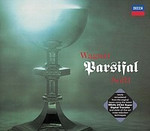|
Back
07/31/2018
Richard Wagner: Parsifal, WWV 111
René Kollo (Parsifal), Gottlob Frick (Gurnemanz), Dietrich Fischer-Dieskau (Amfortas), Christa Ludwig (Kundry), Zoltán Kelemen (Klingsor), Hans Hotter (Titurel), Robert Tear, Herbert Lackner (Grail Knights), Rotraud Hansmann, Marga Schiml, Heinz Zednick, Ewald Aichberger (Squires), Birgit Finnilä (Voice from Above), Lucia Popp, Alison Hargan, Anne Howells, Kiri te Kanawa, Gillian Knight, Margarita Lilowa (Flower Maidens), Vienna State Opera Orchestra and Chorus, Norbert Balatsch (chorus master), Sir Georg Solti (conductor), Christopher Raeburn (producer)
Recording: Sofiensaal, Vienna, Austria (1972) (several sessions) – 260'
4 CDs Decca 483 2510 (plus one Audio Blu-ray disc 483 2958) – Booklet and libretto in German, English and French

   
This recording was made during the lengthy afterglow of the huge and surprising success Georg Solti had achieved with his recording of Wagner’s Ring cycle (1958-65.) Parsifal was recorded in the same hall, using the same orchestra and chorus, over several sessions throughout 1972.
The recording has been re-released over the decades and here it is again. This issue counts as a double release, with the opera on four CDs and also on a single “Pure Audio Blu-ray Disc” (96kHz 24-bit audio.)
Thanks to the placement of microphones, the sound one hears has a degree of hyper-reality unlike the blended sound one would hear in a concert hall or opera house. The cast consists of the top singers of the day, some at the end of a career (e.g., Gottlob Frick, a mellow Gurnemanz), some closer to the start (René Kollo, a bit of a blank as first - as Parsifal is - and then as passionate as one would want in Act II.) In the role of Amfortas Dietrich Fischer-Dieskau isn’t as overtly anguished as some more recent singers - there is more understated tension. Hans Hotter is a luxurious casting, indeed, in the brief role of Titurel.
Christa Ludwig’s career didn’t have a peak so much as an astonishingly high plateau and here she is in the midst of it. Zoltán Kelemen vividly characterizes Klingsor. Smaller roles stand out; when did one pay much attention to the Third Squire? When Heinz Zednick sings it, one does. And look at the list of Flower Maidens: Lucia Popp, Kiri te Kanawa, etc. It could all be described as a bit much, but isn't that exactly what one wants?
The overall effect is thrilling. There is a lot of discussion amongst Wagnerites about which recording is best, and three (or more) seem to come out on top: this one, Herbert von Karajan’s from 1981, and Hans Knappertsbusch’s Bayreuth live performances, one from 1951, another from 1962. Von Karajan transports the listener into a dream state; Solti’s is more up close and personal. If you get captured by the Parsifal spell, you will want to explore them all. This takes a lot of time and “time here becomes space” (Guremanz, Act I.) You have been warned.
Michael Johnson
|